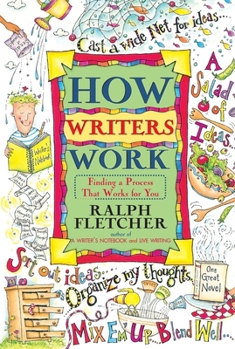How Writers Work: Finding a Process That Works for You
Select Format
Select Condition 
Book Overview
Unlock the secret to being a writer Turn to this practical and enjoyable guide by the bestselling author of A Writer's Notebook and the ALA Notable Book Fig Pudding . Surprise There is no secret to being a writer. But there is a process. Good writing isn't forged by magic or hatched out of thin air. Good writing happens when you follow certain steps to take control of your sentences--to make your words do what you want them to do. This book lifts the curtain on how writers work and helps aspiring writers discover their own writing process. Perfect for classrooms, How Writers Work is full of practical wisdom. It's tailored especially for young writers, but aspiring authors of all ages can benefit from bestselling writer Ralph Fletcher's tips. Everyone can struggle with the writing process at times. Unlock your potential by reading How Writers Work
Format:Paperback
Language:English
ISBN:038079702X
ISBN13:9780380797028
Release Date:July 2000
Publisher:HarperCollins
Length:128 Pages
Weight:0.15 lbs.
Dimensions:0.4" x 5.1" x 7.5"
Age Range:8 to 12 years
Grade Range:Grades 3 to 7
Customer Reviews
5 ratings
Great book!
Published by Thriftbooks.com User , 15 years ago
I received the book in the exact condition as promised. This is a great book for teaching writing as it gives a very logical understanding of the writing process.
How Writer's Work
Published by Thriftbooks.com User , 16 years ago
Ralph Fletcher is a wonderful author with great ideas for teaching writing. His books are infinitely readable!
How Writer's Work
Published by Thriftbooks.com User , 18 years ago
Similar to other Fletcher writing books Excellent to use with writing lessons--esp. at the beginning of the school year
Suzie's Review
Published by Thriftbooks.com User , 19 years ago
Mr. Fletcher wrote this book as a how-to for younger students, but anyone can get something from this book. It does a great job of walking the reader through a step-by-step process of how to be the best writer possible with an easy to follow format and many helpful ideas to accomplish the process. I think the point Mr. Fletcher is trying to convey to his reader is that writers are not mysticals who exist in a far off wonderland; they are everyday people, and anyone can be a writer-all it requires is releasing the energy of talking on paper. I think this book would be a beneficial part of any classroom library because it's a quick read and packed with ways to start out even the youngest of writers. The section of this book that is dedicated to expaining what students do when they are facing problems writing, will help other students relate to this book.
Another Indispensable Book for Kid Writers by Ralph Fletcher
Published by Thriftbooks.com User , 21 years ago
This book is unique in that it talks directly to kids about writing, in a personal rather than a "textbook" manner. I can't think of any other books for kids that do this (other than the others by Fletcher listed at the end), and it is so valuable! The book is also simply very interesting and well-written.This book is not about the craft and mechanics of writing, but about how to establish that all-important *habit* of writing. It's about all the elements that enable and support a person to actually write. I don't know whether this book or "A Writer's Notebook" by Ralph Fletcher should be read first; they are both so important. I'm thinking of having my students read them concurrently.I love the fact that Fletcher does not teach "the process," but rather encourages kids to find their own process. He cautions students not to "prewrite the life out of their topic" through excessive prewriting. It is also made clear, through the book's inspiring interviews with children's writers, that the processes that these successful writers use differ greatly from each other. One of the authors says she would never talk about her topic before writing about it, because "ideas bring with them an energy to write them. If I talk about them instead, I lose that initial energy that's crucial." I am a prolific writer, have almost never written an outline (before writing) in my life, and have always disagreed with requiring kids to do so (see Peter Elbow books for more on the process I use - freewriting). Some of the topics this book goes into are where to write, finding an idea, brainstorming, getting started, amount to write, rereading, handwriting vs. using a computer, research, rough drafting, revision, and the proper place of grammar and spelling (definitely never "disturb the flow," when you're writing well, to deal with them). In all these topics, a variety of options are given, with liberal use of quotes from both kids and adult authors.Fletcher makes it clear that "getting an idea" and "getting started" are two distinct activities, and not necessarily related. It's common to have a great idea that you never bring to fruition, and even more common to just start writing, with no ideas initially. In fact he goes into the value of writing "just a bunch of slop," and valuing it as a form of "exercising." His overall message is that although some people are born or inspired writers, for most people, writing is hard work. You have to live a full life to have material; be conscientious in capturing those inspired thoughts and moments in your writer's notebook; do the tough work of writing something bad as a first draft; be open to "radical surgery" type revision; reread your own work incessantly; solicit feedback; be a careful editor; and look for appropriate places to publish.Lastly, I read this book as a mother of three and a teacher who supervises homeschooling families. Since reading this (and Fletcher's other wonderful books: "A Writer's Notebo





